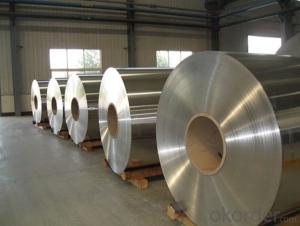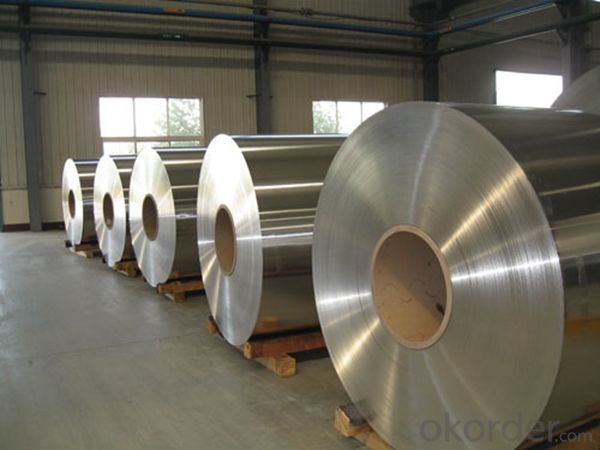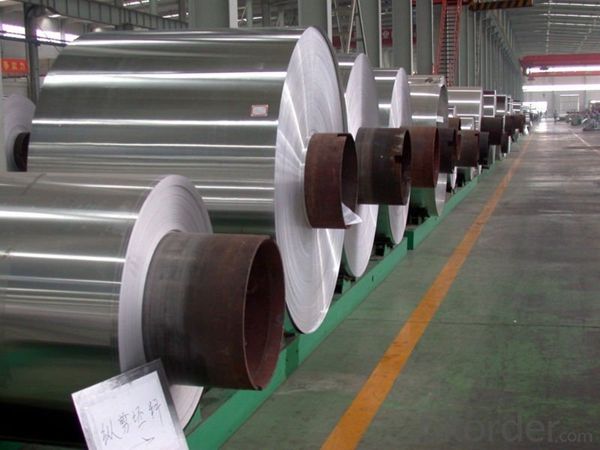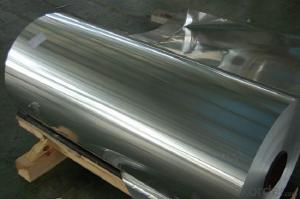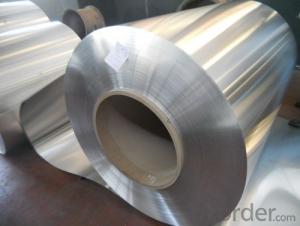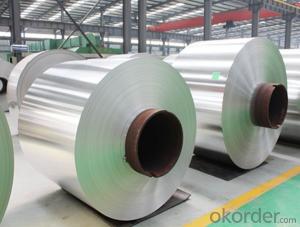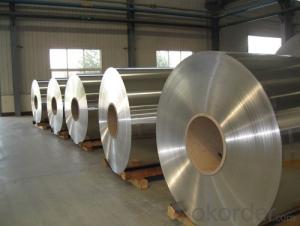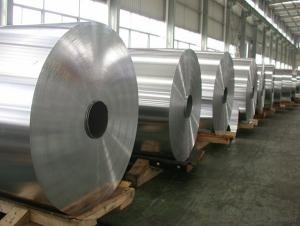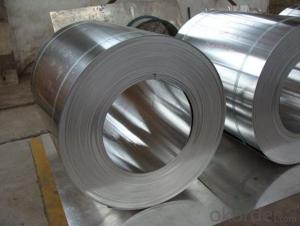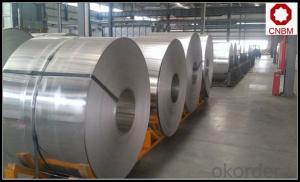Mill Finish Aluminum Coil Price Per Kg 1050 1060 1070 - China Factory Direct Supply
- Loading Port:
- Shanghai
- Payment Terms:
- TT OR LC
- Min Order Qty:
- 5 m.t.
- Supply Capability:
- 1000 m.t./month
OKorder Service Pledge
OKorder Financial Service
You Might Also Like
Specification
1. Specification of Mill Finish Aluminium 1050 1060 1070 China Factory Direct Supply
Alloy Number | AA5XXX |
Temper | H12, H14, H16, H18, H22, H24, H26, H32, HO, F |
Thickness | 0.1mm – 500mm |
Width | 10mm- 2200mm |
Standard | GB/T3880-2006, ASTM, ISO, EU standard |
2. Application of Mill Finish Aluminium 1050 1060 1070 China Factory Direct Supply
(1).Interior: wall cladding, ceilings, bathrooms, kitchens and balconies, shutters, doors...
(2).Exterior: wall cladding, facades, roofing, canopies, tunnels,column covers , renovations...
(3).Advertisement: display platforms, signboards, fascia, shop fronts...
3. Feature of Mill Finish Aluminium 1050 1060 1070 China Factory Direct Supply
Surfact Quality :
Be free from Oil Stain, Dent, Inclusion, Scratches, Stain, Oxide Dicoloration, Breaks, Corrosion, Roll Marks, Dirt Streaks and other defect which will interfere with use,
Mechenical Property:
Chemical Composite and Mechanical Property
4. Certificate:
SGS and ROHS(if client request, paid by client), MTC(plant provided), Certificate of Origin(FORM A, FORM E, CO), Bureau Veritas and SGS (if client request, paid by client), CIQS certificate
5. Image of Mill Finish Aluminium 1050 1060 1070 China Factory Direct Supply
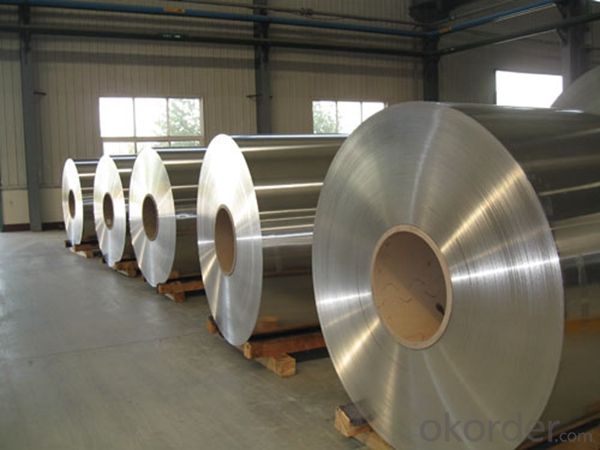
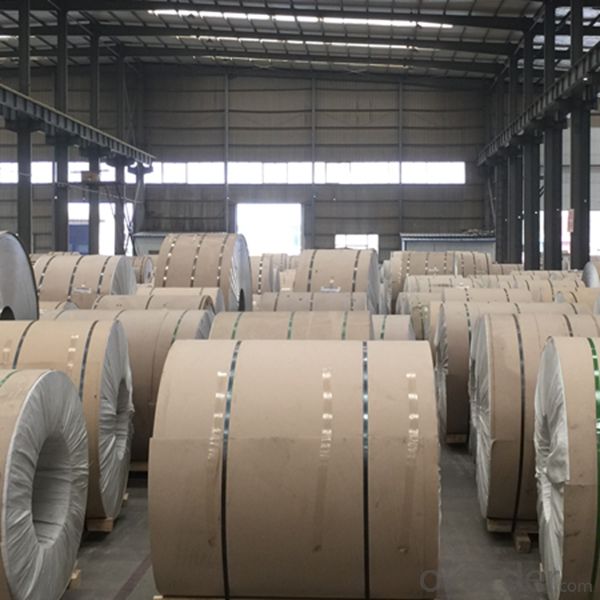
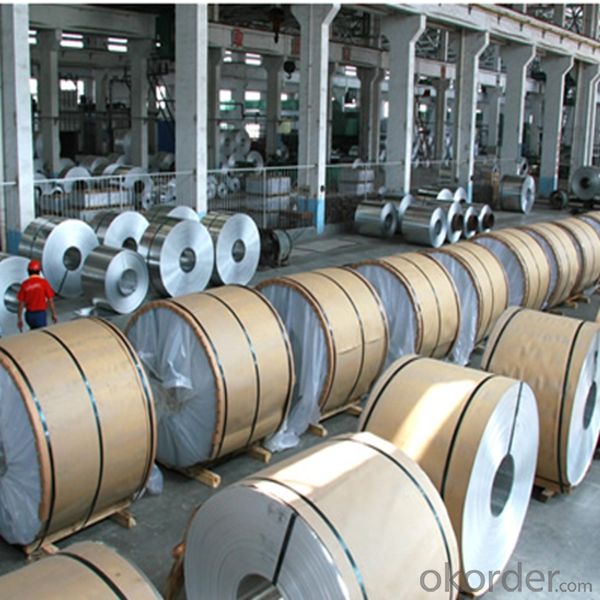
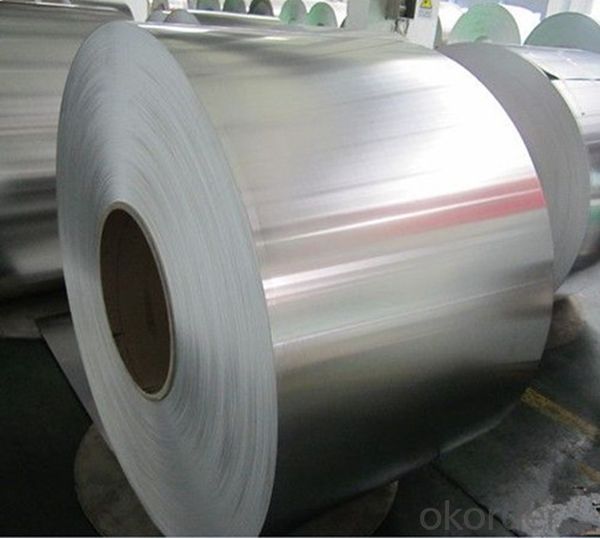
6. Package and shipping of Mill Finish Aluminium 1050 1060 1070 China Factory Direct Supply
First, plastic cloth with drying agent inside; Second, Pearl Wool ; Third, wooden cases with dry agent , fumigation wooden pallets, aluminum surface could cover blue PVC film
7. FAQ
1) What is the delivery time?
Dpends on actual order, around 20 to 35 days
2)What is the QC system:
We have QC staff of 20 persons and advanced equipment, each production is with MTC traced from Aluminum ingot lot.
3) What market do you mainly sell to?
Australia, America, Asia, Middle East, Western Europe, Africa etc
- Q: Aluminum extrusions are bars made with hollow cavities that allow each to be joined easily, using special connectors. The primary difficulty when painting aluminum extrusions centers on the fact that they are nonporous and durable. Each of these traits creates a complication of its own.
- Your question supposes that you need to Paint the Aluminum Extrusion. The more common thing to do is to Anodize the extrusion. This process coats all surfaces with a hard durable coating. There are several colors available. Actually It's common to use Urethane's to paint Aluminum and the primer isn't simply made for metal, but is specifically for Aluminum. A lot of Airplanes are coated every day in this manner. Methods for coating the insides of tubing have been used for a very long time. You basically fill the tube with primer or coating then drain the excess out (dip method) and difficult shapes can be powder coated or electro static coated. Extrusions can be roller coated after cleaning, vinyls work very well with out priming. Think Toothpaste tubes.
- Q: What is the corrosion resistance of aluminum coils in saltwater environments?
- Saltwater environments do not pose a problem for aluminum coils as they possess outstanding resistance to corrosion. This is primarily due to the creation of a protective oxide layer on the aluminum surface, effectively acting as a shield against corrosion. By forming a barrier, this oxide layer prevents direct contact between the aluminum and saltwater, significantly reducing the likelihood of corrosion. Furthermore, aluminum itself has inherent resistance to saltwater corrosion as it is a relatively inert metal. Consequently, aluminum coils are widely utilized in various marine applications, including boat hulls, offshore structures, and saltwater cooling systems. Nevertheless, it is crucial to acknowledge that prolonged exposure to saltwater can still result in some degree of corrosion over time. To enhance the durability and performance of aluminum coils in saltwater environments, regular maintenance and suitable protective coatings are advised.
- Q: What are the properties of aluminum coils?
- Aluminum coils possess several key properties that make them highly sought after in various industries. Firstly, aluminum coils have a high strength-to-weight ratio, meaning they are lightweight yet durable. This characteristic makes them ideal for applications where weight reduction is crucial, such as in the aerospace industry. Additionally, aluminum coils exhibit excellent corrosion resistance. The formation of a thin, protective oxide layer on the surface of the metal helps prevent further oxidation, making them suitable for outdoor and marine environments. This corrosion resistance also translates to a longer lifespan, reducing maintenance requirements and costs. Another important property of aluminum coils is their high thermal conductivity. This feature allows for efficient heat transfer and makes them well-suited for applications in the heating, ventilation, and air conditioning (HVAC) industry. Furthermore, aluminum coils have excellent electrical conductivity, making them favorable for use in electrical and electronic components. Aluminum coils are also highly malleable and ductile, allowing for easy shaping and forming. This versatility makes them a popular choice in manufacturing processes, such as in the production of automobile parts, cans, and packaging materials. Lastly, aluminum coils are known for their recyclability. They can be easily melted down and reused without compromising their quality, making them an environmentally friendly choice. This recyclability aspect aligns with the increasing focus on sustainability and reducing the environmental impact of various industries. In summary, aluminum coils possess properties such as high strength-to-weight ratio, corrosion resistance, thermal and electrical conductivity, malleability, and recyclability. These properties make them valuable in numerous applications across various industries.
- Q: How are aluminum coils processed for specific surface finishes?
- Aluminum coils are processed for specific surface finishes through a series of steps that involve cleaning, pretreatment, coating, and curing. The first step in processing aluminum coils is cleaning. This involves removing any dirt, oil, or other contaminants from the surface of the coils. Cleaning is typically done using a combination of chemical cleaners and mechanical methods, such as scrubbing or brushing. After cleaning, the coils undergo a pretreatment process. Pretreatment is essential to ensure proper adhesion of the surface finish. It involves the application of a chemical solution or coating that prepares the surface of the aluminum for the subsequent coating. This step typically includes processes like etching, desmutting, and deoxidizing, which help improve the surface quality and promote adhesion. Once the coils have been cleaned and pretreated, they are ready for coating. The specific coating method depends on the desired surface finish. Some common coating techniques include coil coating, anodizing, painting, or powder coating. Coil coating involves the application of a liquid coating onto the surface of the aluminum coils. Anodizing is an electrochemical process that creates a durable and corrosion-resistant layer on the surface. Painting and powder coating involve the application of a dry paint or powder onto the coils, which is then cured to form a protective and decorative finish. After the coating is applied, the coils go through a curing process. Curing involves subjecting the coated coils to high temperatures, which causes the coating to chemically react and harden. This step is crucial for achieving the desired properties and durability of the surface finish. Overall, the processing of aluminum coils for specific surface finishes involves a combination of cleaning, pretreatment, coating, and curing steps. These processes ensure that the coils are properly prepared and coated to achieve the desired surface finish, whether it be for protection, aesthetics, or specific functional requirements.
- Q: Can aluminum coils be used in pharmaceutical manufacturing?
- Yes, aluminum coils can be used in pharmaceutical manufacturing. Aluminum is a commonly used material in the pharmaceutical industry due to its excellent properties such as corrosion resistance, light weight, and ability to maintain product integrity. Aluminum coils are often utilized for packaging purposes, such as in blister packs, due to their suitability for protecting the medicine from moisture, light, and external contaminants.
- Q: How much is the 25mm aluminum coil at current market?
- You must mean 25-wide aluminum coil. The price consists of the aluminum ingot price and processing charges. For example, if the processing price is 4500 yuan, it is relatively cheap. 25mm-wide aluminum coil is very narrow, so it will be much complicated to strip.
- Q: What are the energy efficiency benefits of aluminum coils?
- Aluminum coils provide numerous energy efficiency benefits that make them a preferred choice in various industries. Firstly, aluminum is an excellent conductor of heat, allowing for efficient transfer of thermal energy. This property is especially advantageous in the HVAC industry, where aluminum coils are commonly used in air conditioning and refrigeration systems. The high thermal conductivity of aluminum ensures that heat is effectively absorbed or released, resulting in faster cooling or heating processes and lower energy consumption. Additionally, aluminum coils possess exceptional corrosion resistance, which helps maintain their efficiency over time. Unlike other metals that may deteriorate due to exposure to moisture or chemicals, aluminum remains unaffected, ensuring optimal heat transfer efficiency throughout the lifespan of the coil. By preserving the coil's performance, energy losses due to reduced heat transfer are minimized, resulting in energy savings and increased system efficiency. Another significant advantage of aluminum coils is their lightweight nature. Compared to traditional copper coils, aluminum coils are significantly lighter, making them easier to handle during installation and maintenance. The reduced weight also translates into lower energy requirements for transportation, resulting in reduced carbon emissions associated with shipping. Furthermore, aluminum is a recyclable material, making it environmentally friendly and sustainable. The recycling process of aluminum requires significantly less energy compared to primary production, leading to reduced greenhouse gas emissions. By choosing aluminum coils, businesses can contribute to a more sustainable future by reducing their carbon footprint. Overall, the energy efficiency benefits of aluminum coils are vast. Their excellent thermal conductivity, corrosion resistance, lightweight nature, and recyclability make them an ideal choice for various applications, leading to reduced energy consumption, enhanced system performance, and a more sustainable environment.
- Q: Can aluminum coils be used in the production of consumer electronics?
- Consumer electronics can make use of aluminum coils. Aluminum, being a versatile and lightweight metal, offers numerous advantages in the manufacturing of electronic devices. With its exceptional thermal conductivity, it is perfect for dissipating heat in components like motors, transformers, and power supplies. Aluminum coils find widespread application in smartphones, laptops, and tablets. They are commonly utilized in constructing the housing or casing of these devices, providing a durable and lightweight solution. Moreover, aluminum's non-magnetic nature makes it suitable for electronic devices that require minimal magnetic field interference. Furthermore, aluminum coils exhibit good electrical conductivity, making them valuable in applications that necessitate efficient transmission of electrical signals. They are frequently used in manufacturing antennas, connectors, and other electronic components that require high conductivity. Additionally, aluminum is highly recyclable, aligning with the increasing demand for sustainable manufacturing practices. Incorporating aluminum coils into consumer electronics not only offers functional benefits but also contributes to a greener and more environmentally friendly production process. In conclusion, aluminum coils are indeed suitable for use in the production of consumer electronics due to their exceptional thermal conductivity, lightweight and durable properties, good electrical conductivity, and recyclability.
- Q: How are aluminum coils formed into different shapes and profiles?
- Metal forming is the process by which aluminum coils are transformed into various shapes and profiles. This involves applying force to the coil to alter its shape and contour. There are multiple techniques employed for shaping aluminum coils, including rolling, bending, extrusion, and stamping. The most commonly used method for shaping aluminum coils is rolling. This entails passing the coil through a series of rollers that gradually change its shape by applying pressure. The rolling process can be carried out either hot or cold, depending on the desired outcome. Hot rolling is typically used for thicker coils, while cold rolling is suitable for thinner ones. Bending is another technique employed to shape aluminum coils, particularly when creating curved or angled profiles. This can be done manually or with the assistance of specialized bending machines. By exerting force, the coil is bent to the desired shape, creating curves or angles as required. Bending is widely utilized in applications such as HVAC systems, automotive components, and construction. Extrusion is a process in which the aluminum coil is forced through a die to achieve a specific cross-sectional shape. The coil is heated and pushed through the die, which determines the final shape of the extrusion. This method is frequently employed to create intricate profiles with consistent dimensions, such as window frames, door frames, and structural components. Stamping is a technique utilized to produce precise shapes and patterns on the surface of aluminum coils. It involves pressing the coil against a die with the desired design, causing the metal to deform and adopt the shape of the die. Stamping is commonly employed for decorative purposes, such as creating patterns, logos, or text on aluminum sheets. In conclusion, various metal forming methods, namely rolling, bending, extrusion, and stamping, enable aluminum coils to be transformed into diverse shapes and profiles. These processes facilitate the customization and versatility of aluminum in numerous industries and applications.
- Q: Are there any specific certifications or qualifications required for aluminum coil suppliers?
- Yes, there are specific certifications and qualifications required for aluminum coil suppliers. These may include ISO certifications, quality management systems, and adherence to industry standards such as ASTM (American Society for Testing and Materials) or EN (European Norm) specifications. Additionally, suppliers may be required to meet certain regulatory requirements, such as those related to environmental sustainability or occupational health and safety.
Send your message to us
Mill Finish Aluminum Coil Price Per Kg 1050 1060 1070 - China Factory Direct Supply
- Loading Port:
- Shanghai
- Payment Terms:
- TT OR LC
- Min Order Qty:
- 5 m.t.
- Supply Capability:
- 1000 m.t./month
OKorder Service Pledge
OKorder Financial Service
Similar products
Hot products
Hot Searches
Related keywords
